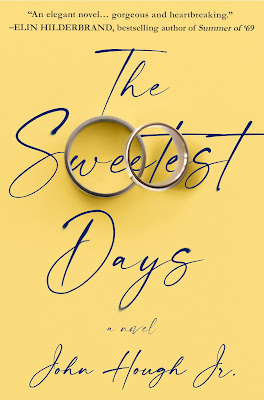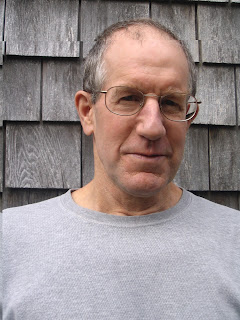HANK PHILLIPPI RYAN: Happy Father’s Day, dearest Reds and readers, and if you celebrate this, hurray and wonderful. If not, it’s the summer solstice, isn’t it? And that’s a celebration of its own.
Either one indicates time is going by, a marker of change and remembrance, of new days and days past.
We’ve all talked about our fathers here, and that’s one thing that makes us such a community--you know about all of ours, right? And we have heard about yours, and that brings us even closer.
I recently found a Father’s Day card that I hadn’t sent--one of those cards that you buy on a whim because it’s perfect, and then you think--I’ll save this for next year. And then at some point, there isn’t a next year. So--hugs and memories to all.
So let me tell you about another father. And how he came to be on these pages today.
Recently--whatever that means these days---I shared a writing/reading event with an author I hadn’t met before, John Hough, Jr. He lives on Martha’s Vineyard, and was appearing for his book Little Big Horn, a story that's been compared to Lonesome Dove. We had a terrific time, and the crowd loved him, and when I took that book home, Jonathan grabbed it and devoured it.
Everyone promised to stay in touch. And you know how those things go. And then the pandemic.
And then I got a note from John, saying he had a new book coming out, a different book, and asking if he could send it to me. When it arrived, I saw that it wasn’t the same genre as the previous one.
THE SWEETEST DAYS, it was titled, and the cover had two wedding rings. Huh. And a blurb from Elin Hilderbrand. Huh. I stood at our kitchen counter, and thought, I have to work! But I’ll just read the first page and see how this is.
Twenty minutes later, I was still standing at the counter turning the pages. Reds and readers, do NOT miss this. There’s a synopsis below. Whoa.
So of course I invited him to the blog, and what did he send? By chance and by serendipity, the perfect story for Fathers Day.
That Was My Father
He sits forever at his desk in the bright airy newsroom, arms folded, sleeves rolled, necktie loosened, staring at the blank sheet in his typewriter, thinking. A typewriter rattles nearby. A phone rings. He doesn’t hear them. He unfolds his strong arms, and now his hands go to the keyboard. They caress it a moment, and then he’s writing--rapidly, more rapidly still, words flying onto the page.
This was my father, Jack Hough, editor and publisher of the Falmouth Enterprise for 25 years, until his retirement in 1994. My memory of him at work goes back to the summers of my college years. Falmouth is a seaside resort, and Dad would hire an extra reporter for the summer, to help him keep up with the seasonal bustle. He hired me, at my urgent request, for three summers. My beat included ball games, fishing, musical theater, the island ferries, sailboat races—the blithe rituals and diversions of summer on Cape Cod. I also covered burglaries, house fires, bar room eruptions, a few shark scares.
My father may have hoped I would succeed him at the Enterprise, as he had succeeded his own father not many years before. But I had other ideas, and he was generous enough to accept that. He may even have known I had dreams of becoming a novelist. Whatever I did, I was going to write, and Dad took it upon himself to teach me how.
The tutorials often took place at his desk. There was a chair alongside, and he would call me over and discuss copy I’d written. We talked at home, at odd times, or driving home from the office at day’s end. English is the richest of languages, he said—he liked to point out that an English dictionary is twice as thick as a Larousse—and there is one right word for everything. Know the true meaning of every word you use, and where it came from. There was an enormous Webster’s Unabridged in the newsroom, and he sent me to it again and again.
To know a word is to know its connotation. There are no forests on sandy Cape Cod, there are woods. (Maine and Canada have forests.) After I wrote my first theater review I found a note under the bail of my typewriter: Crowd in Fenway Park, audience in a theater.
Write strong declarative sentences. Favor active verbs over participles. Avoid the passive voice. He quoted Mark Twain, “As to the adjective, when in doubt, strike it.” He wouldn’t allow “virtually,” as in “the building was virtually empty”—was it empty, or wasn’t it? He wouldn’t allow “inclement weather”—inclement how? Police reports cited “driving under the influence;” in the Enterprise it was “drunken driving.”
Falmouth, the Enterprise, and different versions of my father turn up repeatedly in my fiction. In The Sweetest Days Falmouth is Dunstable, the Enterprise is the Inquirer, the editor is Ed Hatch, a gifted newspaperman of high intelligence, like my father.
The novel is about roads taken and not taken, life choices that make all the difference. My father, who could have gotten a job anywhere, chose Falmouth and the Enterprise, abandoning dreams of New York, Washington, a bureau overseas. The dreams pursued him down the years, those beckoning roads not taken, all but blinding him to his own excellence, his superb stewardship of the Enterprise.
My father, the best newspaperman I’ve ever known, was modest to a fault. For what it’s worth, I wouldn’t be the writer I am without him.
HANK: Told you.
(My Dad was a newspaperman, too. One of his classic lines: “There’s always another typo.” Truer words were never spoken.)
Reds and readers, what--or who--are you thinking about today? And a copy of THE SWEETEST DAYS to one lucky commenter! (Kleenex not included..)
THE SWEETEST DAYS
Peter and Jacqueline Hatch have been married for decades, after a stumbling beginning together. They were high school sweethearts in 1964, when Pete left her without saying good-bye and disappeared from school, enveloped in scandal and tragedy. They reunited after a chance encounter 11 years later, and an impulsive marriage soon followed. Now in their sixties, with their only daughter grown, and facing ominous news about Jackie’s health, they travel to their Cape Cod hometown for Pete’s first book signing. An old schoolmate turns up at the signing, bringing the past with him, and raising questions that bring Pete’s and Jackie’s long marriage to the breaking point. “I never lied to you,” he tells her. “I’ll be the judge of that,” Jackie says.
John Hough Jr. is the author of six novels, including The Last Summer and Seen the Glory: A Novel of the Battle of Gettysburg, winner of the American Library Association’s W.Y. Boyd Award. He is a graduate of Haverford College, a former VISTA volunteer, speechwriter for Senator Charles Mathias of Maryland, and assistant to James Reston at the Washington Bureau of the New York Times. He lives on Martha’s Vineyard.



